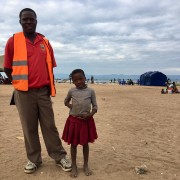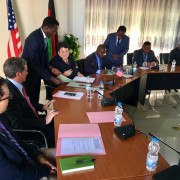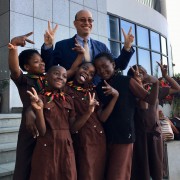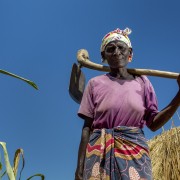Speeches Shim

The GoM has set the ambitious goal of achieving HIV epidemic control by reaching the 90-90-90 mark: 90 percent of people with HIV know their status; 90 percent of people with HIV are on antiretroviral treatment (ART); 90 percent of people on ART have viral suppression. One of the impediments to achieving this goal is finding, testing, and treating high-risk, hard-to-reach populations, such as fishers and bike taxi drivers.

On Tuesday, July 24, 2018, U.S. Ambassador to Malawi Virginia Palmer and Minister of Foreign Affairs Emmanuel Fabiano signed a Memorandum of Understanding (MOU) outlining their joint contributions to the Secondary Education Expansion for Development (SEED) initiative. SEED seeks to address a critical shortage of facilities, teachers, and seats needed to accommodate the more than 20,000 female students who graduate from primary school each year, but are unable to continue to secondary due to lack of space. Evidence suggests that a girl who is unable to proceed through school is at greater risk across an array of destructive outcomes and behaviors, including early sexual debut, HIV infection, early marriage, and economic marginalization.

On Tuesday, August 14th, Malawi’s Minister of Labour, Youth, Sports, and Manpower Development Francis Kasaila was joined by Chargé d’affaires Andrew Herrup and Malawi’s Minister of Health and Population Atupele Muluzi to officially launch Malawi’s National Strategy of Adolescent Girls and Young Women (AGYW). Over the past 18 months, Ambassador Virginia Palmer, USAID, and PEPFAR have been deeply engaged with the Government of Malawi (GOM), UNICEF, donors, and public/private stakeholders to draft a strategy that will bring clear structure and coordination mechanisms to Malawi’s many youth (particularly AGYW) initiatives.
USAID/Malawi has developed a Request for Information for the purpose of knowing: 1) ways to strengthen incentives and disincentives to counter illegal, and unsustainable firewood and charcoal production; and 2) which organizations, including the private sector, are promoting alternative, efficient energy technologies coupled with behavior change strategies to reduce demand for charcoal and firewood use for domestic and/or industrial energy needs. USAID/Malawi seeks information to help inform interventions aimed at Sustainable Management of Priority Forests and Bordering Watersheds to increase forest cover, promote land-based emissions reductions and support livelihoods.

Smallholder farmers cultivate 90% of the arable land in Malawi and face many challenges including declining soil fertility, erratic rainfall, land constraints, and poor institutional support. With limited access to credit, inputs, and price information, the typical farmer struggles to support a family of six on only one hectare of land. Also, Malnutrition particularly is a major problem causing stunting for 47% of children under the age of 5.


Comment
Make a general inquiry or suggest an improvement.